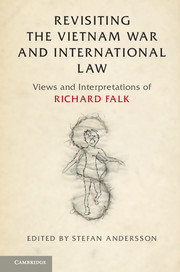Book contents
- Frontmatter
- Dedication
- Contents
- Foreword: The Harmful Legacy of Lawlessness in Vietnam
- Preface
- Acknowledgments
- PART I THE US ROLE IN VIETNAM AND INTERNATIONAL LAW
- 1 A Vietnam Settlement: The View from Hanoi
- 2 US in Vietnam: Rationale and Law
- 3 International Law and the United States Role in the Viet Nam War
- 4 International Law and the United States Role in Viet Nam: A Response to Professor Moore
- 5 The Six Legal Dimensions of the Vietnam War
- PART II WAR AND WAR CRIMES
- PART III THE VIETNAM WAR AND THE NUREMBERG PRINCIPLES
- PART IV THE LEGACY OF THE VIETNAM WAR
- Index
5 - The Six Legal Dimensions of the Vietnam War
from PART I - THE US ROLE IN VIETNAM AND INTERNATIONAL LAW
Published online by Cambridge University Press: 28 December 2017
- Frontmatter
- Dedication
- Contents
- Foreword: The Harmful Legacy of Lawlessness in Vietnam
- Preface
- Acknowledgments
- PART I THE US ROLE IN VIETNAM AND INTERNATIONAL LAW
- 1 A Vietnam Settlement: The View from Hanoi
- 2 US in Vietnam: Rationale and Law
- 3 International Law and the United States Role in the Viet Nam War
- 4 International Law and the United States Role in Viet Nam: A Response to Professor Moore
- 5 The Six Legal Dimensions of the Vietnam War
- PART II WAR AND WAR CRIMES
- PART III THE VIETNAM WAR AND THE NUREMBERG PRINCIPLES
- PART IV THE LEGACY OF THE VIETNAM WAR
- Index
Summary
This monograph deals with the legal status of the United States involvement in the Vietnam war. It tries to move beyond the existing legal literature in two principal respects:
(1) By developing arguments for bringing international law to bear more effectively on the foreign policy-making process in the future than has been evident through the course of the Vietnam war;
(2) By expanding legal inquiry to include questions of war crimes, constitutional procedure, and war-related litigation; this second undertaking is carried out through the device of briefly considering the six major legal dimensions of the United States involvement in the Vietnam war.
It is important to make clear that I do not attempt a balanced, fully documented argument on “the grand question” of aggression and self-defense in Vietnam. There is an abundant literature on this question that reflects a variety of normative perspectives. My objective is to develop a coherent position that builds upon, rather than duplicates, my previous writing on the subject. In this respect, the monograph proceeds from the presupposition that international law forbids both the underlying involvement and the battlefield practices being relied upon in Vietnam by the United States government.
At the same time, my purpose is not to engage in polemics; it is rather to argue for a constructive reconsideration of the governmental procedures and practice that enable an American President to involve the country in the internal affairs of a foreign society, especially through policies designed to influence the outcome of struggle for control of governmental machinery. The need for reconsideration extends far beyond the power that commits United States armed forces to battle without any prior legislative authorization. It extends to the discretionary use of the CIA to effectuate desired political changes in foreign countries, if necessary, by means that violate the legal order of the target state. The need for reconsideration extends, as well, to the provision of military aid and advice to regimes that govern in a manner violating the liberal democratic creed that our government is pledged to uphold within the United States.
- Type
- Chapter
- Information
- Revisiting the Vietnam War and International LawViews and Interpretations of Richard Falk, pp. 134 - 176Publisher: Cambridge University PressPrint publication year: 2017
- 1
- Cited by

